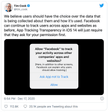
Social Trends
Goliath vs. Goliath
By Andrew Douglas | 2 min read
How to make sure you don’t become the David in the Apple vs. Facebook war
Tim Cook, Apple CEO and Facebook founder and CEO Mark Zuckerberg aren’t buddies. They’ve been sniping at each other for years. But a relatively cold war got very hot just before Christmas. That’s when Cook announced that with the iOS 14 update Apple users would have to opt-in to allow apps like Facebook to track their behaviour across apps and websites.
Here’s the tweet from Cook:
Facebook has freaked out, making accusations that Apple is trying to kill the free internet. They even took out full-page newspaper ads in the US to complain.
It’s not hard to see why Facebook is raising a fuss. Without being able to track users, Facebook’s advertising platform is a lot less appealing, especially with something they call their Audience Network which allows Facebook to show their ads on other sites. And Apple has a huge share of the marketing. In Canada, it’s an even split between the number of Android and iOS mobile phones
Apple has a real incentive to crack down on in-app advertising. They want to push app developers to a paid model as they make a percentage off every app purchase in the app store. They don’t like free apps.
Facebook Advertising has already changed its attribution model in preparation for Apple’s new privacy prompt. For instance, Facebook’s default attribution window was 28-days, meaning it could attribute actions back to an ad you were served up to 28 days ago. That has now been reduced to seven days.
Changes like this are messing with data that our advertisers have been collecting on their Facebook campaigns. It makes it look like Facebook ads are converting fewer people.
It won’t be clear for a few months exactly how the change in the iOS privacy prompt will affect Facebook advertisers. In the meantime, monitor your campaigns closely. Facebook still has a massive audience, especially if your target audience skews slightly older and female. And ask your digital marketing provider to keep a close watch on your budgets and your cost per click. If advertisers start to drop off Facebook it could mean less competition for eyeballs and cheaper CPMs.
And as always, watch your bottom-line sales. Facebook has always been willing to take your money, producing some tantalizing engagement numbers with limited extra revenue at the advertiser’s end to justify the advertising expense. Read Facebook response and its moves to allow for more data visibility since the iOS 14 launch:
https://www.facebook.com/business/help/331612538028890?id=428636648170202
Book report
“Not all readers are leaders, but all leaders are readers.”
-President Harry S. Truman
A Chic-fil-a chicken sandwich? Meh.
But the fast-food phenomena as an inspiring business model? Now that’s something worth chewing on.
Covert Cows and Chick-fil-A: How Faith, Cows, and Chicken Built an Iconic Brand is a book by the American chain’s long-time marketing director Steve Robinson. It tells the story of Truett Cathy, the famous entrepreneur who started the restaurant chain and grew it to one of the largest restaurant chains in the United States.
A lesson is ALWAYS better when it’s attached to a story. Stories are sticky. This book provides valuable sales and marketing lessons wrapped in the will-the-business-survive kind of story that keeps the reader hooked. It’s not gripping stuff, but it’s better than a lot of business books.
Here’s one takeaway: Use your marketing to make an emotional connection with your customer. “Businesses focused on emotional connections use their platforms to make a meaningful impact on customers. Then those customers become more supportive of the business. They actually root for its success and feel obligated to do business there. Do things worth rooting for. Do things for customers that can’t be weighed or measured—that aren’t expected.”

Andrew Douglas
Andrew is the founder of Story Digital Marketing. He has 30 years of experience in journalism and marketing and is passionate about the written word.
